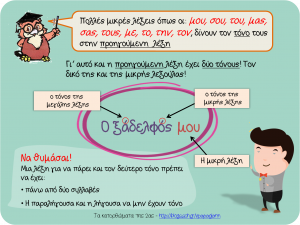Difference between revisions of "Language/Modern-greek-1453/Grammar/Words-with-2-accents"
< Language | Modern-greek-1453 | Grammar
Jump to navigation
Jump to search
| Line 1: | Line 1: | ||
<div style="font-size:300%;">Greek words with two accents</div> | <div style="font-size:300%;">Greek words with two accents</div> | ||
[[File:______ __ ___ ______ - Online ____________ ________ ___ __ ______ _' _________.png|thumb]] | [[File:______ __ ___ ______ - Online ____________ ________ ___ __ ______ _' _________.png|thumb]]When do we put two accents on certain words? | ||
When a proparoxyton word is accompanied at the end by: | |||
μου, σου, του, μας, σας, με, τους, το, την, τον, these words accept two accents. | |||
Single-syllable words always spoken | |||
closely with the previous word are called "enclitics" and that's why their accent is not lost, but is transferred to the end of the previous word. | closely with the previous word are called "enclitics" and that's why their accent is not lost, but is transferred to the end of the previous word. | ||
| Line 48: | Line 19: | ||
απόδωσέ του το 'give it to him), etc. | απόδωσέ του το 'give it to him), etc. | ||
άνθρωπός μου (two accents, enclose accent) | |||
(My man: two accents) | (My man: two accents) | ||
But | |||
Του ανθρώπου μου | |||
(1 τόνος, αφού η λέξη τονίζεται στην παραλήγουσα). | (1 τόνος, αφού η λέξη τονίζεται στην παραλήγουσα). | ||
(from my man: 1 accent, because the word is paroxyton). | (from my man: 1 accent, because the word is paroxyton). | ||
Revision as of 17:54, 27 January 2023
Greek words with two accents
When do we put two accents on certain words?
When a proparoxyton word is accompanied at the end by:
μου, σου, του, μας, σας, με, τους, το, την, τον, these words accept two accents.
Single-syllable words always spoken
closely with the previous word are called "enclitics" and that's why their accent is not lost, but is transferred to the end of the previous word.
For example:
το τετράδιό μου (my notebook), ο πρόεδρός μας (our chairmen),
χάρισμά σου (your gift), άφησέ το (leave it),
απομάκρυνέ τον (keep it away),
απόδωσέ του το 'give it to him), etc.
άνθρωπός μου (two accents, enclose accent)
(My man: two accents)
But
Του ανθρώπου μου
(1 τόνος, αφού η λέξη τονίζεται στην παραλήγουσα).
(from my man: 1 accent, because the word is paroxyton).
